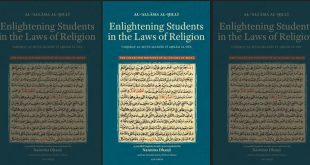The present volume offers over 200 annotated bibliographies of books pertaining to law and ethics in the Muslim world.
This volume brings together some of the many unheard voices of scholars studying law and ethics in languages other than English. It features 200 abstracts with bibliographical details in 3 languages (English, Arabic and Turkish) giving access to information about scholarly publications from Muslim contexts in the fields of law and Shari’ah.
Law within Muslim societies is not uniform; even within Muslim majority regions it can be interpreted differently according to different denominations and legal traditions. As law forms an integral part of normative social practice, reflecting the moral and ethical principles of a society, it is important to highlight the diversity of interpretations to better enable the study of law along with the ethical principles of a community.
The Muslim Civilisations Abstracts (MCA) project has now reached the end of its second stage. Its completion is the result of a team effort involving numerous colleagues and contributors. Abstractors, translators, coordinators and editors from around the world have invested much of their time in order to fulfil the objectives of this project and bring to light another segment of the Muslim world’s vast literature.
For the sake of consistency, this volume fol- lows the paradigm set during the pilot project on encyclopaedias about Muslim civilisations; 1 therefore, in order to avoid redundancy, the technicalities of the project are not repeated in this introduction. Suffice it to say that one of the main goals of this project is to forge links between scholars from different parts of the world to facilitate further progress in the social sciences and humanities. Although the focus of the project is the Muslim world, we rely on the collaboration of our European and American colleagues to translate and promote the works of their peers from the East and the South. Moreover, the Muslim world transcends the borders of Muslim-majority states: countries such as India, Russia and China have a strong and centuries-old Muslim presence. The non- Muslim communities living in Muslim-majority states are also an integral part of the Muslim world. Therefore, the project has taken into consideration as far as possible all the regions and communities implicated, and has sought the cooperation and input of all those interested in Muslim civilisations.
The present volume offers over 200 annotated bibliographies of books pertaining to law and ethics in the Muslim world. This introduction aims to explain the rationale behind the choice of law and ethics as a theme and to clarify the link between these two concepts.
This volume is divided into three sections, by language (English, Turkish and Arabic) each section contains an Introduction followed by the Abstracts.
Aptin Khanbaghi is a senior researcher and team leader for the MCA (Muslim Civilisations Abstracts) project at Aga Khan University. He received his doctorate from Cambridge University in Iranian studies. His academic interests include religious minorities in West Asia and cultural diversity in the Muslim world. Dr Khanbaghi is the author of The Fire, the Star and the Cross: Minority Religions in Medieval and Early Modern Iran (I. B. Tauris, 2006).
Susanne Olsson is Associate Professor at Södertörn University in Stockholm, Sweden, where she is Head of Department for the Study of Religions. She holds a PhD in the History of Religions from Uppsala University, Sweden. She specializes in Islamic Studies and her current research mainly concerns contemporary Islamic ideologies in Egypt and Europe, focusing on questions such as continuity and renewal of Islamic discourses and political aspects of religious interpretations.
Bibliographic Information
Title: Interpretations of Law and Ethics in Muslim Contexts
Author: Aptin Khanbaghi
Publisher: Edinburgh University Press; Mul edition (4 April 2012)
Language: English
Length: 433 pages
ISBN: 978-0748645008
Pub. Date: 4 April 2012
 Ijtihad Network Being Wise and Faithful Muslim in the Contemporary World
Ijtihad Network Being Wise and Faithful Muslim in the Contemporary World

